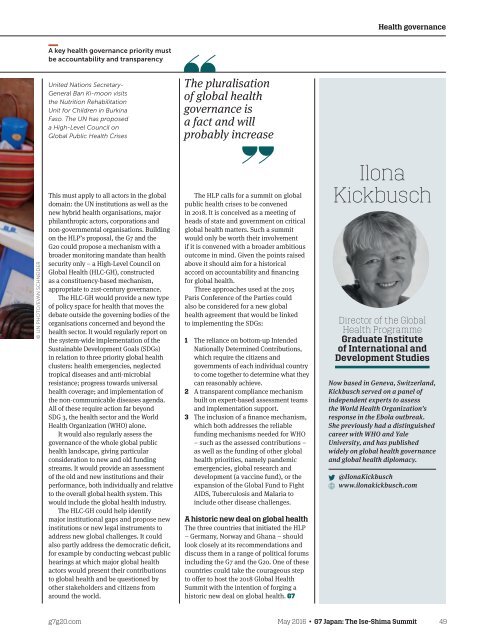G7_JAPAN
Create successful ePaper yourself
Turn your PDF publications into a flip-book with our unique Google optimized e-Paper software.
Health governance<br />
A key health governance priority must<br />
be accountability and transparency<br />
United Nations Secretary-<br />
General Ban Ki-moon visits<br />
the Nutrition Rehabilitation<br />
Unit for Children in Burkina<br />
Faso. The UN has proposed<br />
a High-Level Council on<br />
Global Public Health Crises<br />
The pluralisation<br />
of global health<br />
governance is<br />
a fact and will<br />
probably increase<br />
© UN PHOTO/EVAN SCHNEIDER<br />
This must apply to all actors in the global<br />
domain: the UN institutions as well as the<br />
new hybrid health organisations, major<br />
philanthropic actors, corporations and<br />
non-governmental organisations. Building<br />
on the HLP’s proposal, the <strong>G7</strong> and the<br />
G20 could propose a mechanism with a<br />
broader monitoring mandate than health<br />
security only – a High-Level Council on<br />
Global Health (HLC-GH), constructed<br />
as a constituency-based mechanism,<br />
appropriate to 21st-century governance.<br />
The HLC-GH would provide a new type<br />
of policy space for health that moves the<br />
debate outside the governing bodies of the<br />
organisations concerned and beyond the<br />
health sector. It would regularly report on<br />
the system-wide implementation of the<br />
Sustainable Development Goals (SDGs)<br />
in relation to three priority global health<br />
clusters: health emergencies, neglected<br />
tropical diseases and anti-microbial<br />
resistance; progress towards universal<br />
health coverage; and implementation of<br />
the non-communicable diseases agenda.<br />
All of these require action far beyond<br />
SDG 3, the health sector and the World<br />
Health Organization (WHO) alone.<br />
It would also regularly assess the<br />
governance of the whole global public<br />
health landscape, giving particular<br />
consideration to new and old funding<br />
streams. It would provide an assessment<br />
of the old and new institutions and their<br />
performance, both individually and relative<br />
to the overall global health system. This<br />
would include the global health industry.<br />
The HLC-GH could help identify<br />
major institutional gaps and propose new<br />
institutions or new legal instruments to<br />
address new global challenges. It could<br />
also partly address the democratic deficit,<br />
for example by conducting webcast public<br />
hearings at which major global health<br />
actors would present their contributions<br />
to global health and be questioned by<br />
other stakeholders and citizens from<br />
around the world.<br />
The HLP calls for a summit on global<br />
public health crises to be convened<br />
in 2018. It is conceived as a meeting of<br />
heads of state and government on critical<br />
global health matters. Such a summit<br />
would only be worth their involvement<br />
if it is convened with a broader ambitious<br />
outcome in mind. Given the points raised<br />
above it should aim for a historical<br />
accord on accountability and financing<br />
for global health.<br />
Three approaches used at the 2015<br />
Paris Conference of the Parties could<br />
also be considered for a new global<br />
health agreement that would be linked<br />
to implementing the SDGs:<br />
1 The reliance on bottom-up Intended<br />
Nationally Determined Contributions,<br />
which require the citizens and<br />
governments of each individual country<br />
to come together to determine what they<br />
can reasonably achieve.<br />
2 A transparent compliance mechanism<br />
built on expert-based assessment teams<br />
and implementation support.<br />
3 The inclusion of a finance mechanism,<br />
which both addresses the reliable<br />
funding mechanisms needed for WHO<br />
– such as the assessed contributions –<br />
as well as the funding of other global<br />
health priorities, namely pandemic<br />
emergencies, global research and<br />
development (a vaccine fund), or the<br />
expansion of the Global Fund to Fight<br />
AIDS, Tuberculosis and Malaria to<br />
include other disease challenges.<br />
A historic new deal on global health<br />
The three countries that initiated the HLP<br />
– Germany, Norway and Ghana – should<br />
look closely at its recommendations and<br />
discuss them in a range of political forums<br />
including the <strong>G7</strong> and the G20. One of these<br />
countries could take the courageous step<br />
to offer to host the 2018 Global Health<br />
Summit with the intention of forging a<br />
historic new deal on global health. <strong>G7</strong><br />
Ilona<br />
Kickbusch<br />
Director of the Global<br />
Health Programme<br />
Graduate Institute<br />
of International and<br />
Development Studies<br />
Now based in Geneva, Switzerland,<br />
Kickbusch served on a panel of<br />
independent experts to assess<br />
the World Health Organization’s<br />
response in the Ebola outbreak.<br />
She previously had a distinguished<br />
career with WHO and Yale<br />
University, and has published<br />
widely on global health governance<br />
and global health diplomacy.<br />
@IlonaKickbusch<br />
www.ilonakickbusch.com<br />
g7g20.com May 2016 • <strong>G7</strong> Japan: The Ise-Shima Summit 49
















